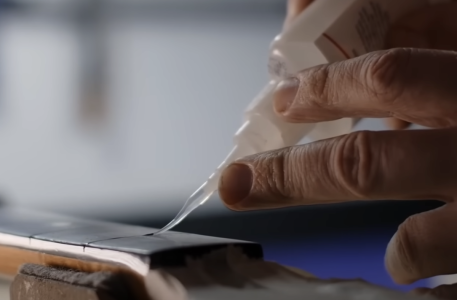The secret trick to removing super glue from almost any surface
By
Veronica E.
- Replies 0
Super glue is a lifesaver when something breaks—whether it’s fixing a pair of glasses, mending a mug, or holding together a grandchild’s school project.
But as anyone who has used it knows, its biggest strength can also be its biggest drawback.
Once it bonds, it can stick to places it doesn’t belong—your skin, clothes, furniture, or even your dining table—and getting it off isn’t easy.
Here at The GrayVine, we know life’s little accidents don’t stop in retirement, and neither does your ability to handle them.
The good news? With the right methods and a few common household products, you can remove even the toughest glue mishaps without damaging your skin or surfaces.

Super glue is made with cyanoacrylate, a fast-drying chemical that reacts with moisture—something that’s everywhere, from your hands to the air itself.
That’s why it creates such a strong bond in seconds.
Once it sets, it often feels impossible to remove without damaging what’s underneath.
But there’s no need to panic.
With patience and the right approach, even the stickiest situation can be undone.
Different surfaces call for different solutions. Here’s a quick guide to the most effective options:
Tip: Always test your chosen method on a hidden area before using it on a larger spot.
1. Skin
2. Glass
3. Plastic
4. Clothes and fabrics
5. Upholstery and carpet
6. Metal
7. Wood
Can I peel glue off my skin?
No—peeling can take off layers of skin. Stick to soaking and gentle rubbing.
What’s safest for plastic?
Nitromethane is ideal, but if you only have acetone, use sparingly and test first.
Is vinegar a good option?
Yes—it’s slower than acetone but safer on fabrics and leather.
Can I use WD-40 on fabrics?
No—it works well on leather but can stain most textiles.
Super glue accidents happen, whether you’re fixing a family heirloom or tackling a quick home repair.
The key is patience and using the right method for the job. With a few simple products, you can avoid turning a sticky situation into a bigger mess.
Read next:

Have you ever had to remove super glue from something unexpected? What trick worked best for you? Share your tips and stories in the comments—your advice might save someone else a lot of frustration!
And next time you grab the glue, keep gloves nearby—you’ll thank yourself later.
But as anyone who has used it knows, its biggest strength can also be its biggest drawback.
Once it bonds, it can stick to places it doesn’t belong—your skin, clothes, furniture, or even your dining table—and getting it off isn’t easy.
Here at The GrayVine, we know life’s little accidents don’t stop in retirement, and neither does your ability to handle them.
The good news? With the right methods and a few common household products, you can remove even the toughest glue mishaps without damaging your skin or surfaces.

A few simple household products can help safely remove stubborn super glue from everyday surfaces. Image Source: YouTube / History of Simple Things.
Why super glue is so tough to remove
Super glue is made with cyanoacrylate, a fast-drying chemical that reacts with moisture—something that’s everywhere, from your hands to the air itself.
That’s why it creates such a strong bond in seconds.
Once it sets, it often feels impossible to remove without damaging what’s underneath.
But there’s no need to panic.
With patience and the right approach, even the stickiest situation can be undone.
Also read: Experts reveal the shocking truth about how often you’re failing to clean your carpets
The best glue removers—and when to use them
Different surfaces call for different solutions. Here’s a quick guide to the most effective options:
- Acetone (nail polish remover): Works fast but can damage plastics, paint, or fabrics.
- Rubbing alcohol: Gentler than acetone and effective on many fabrics.
- Hand sanitizer: Convenient for skin and small spills.
- White vinegar: Safe for delicate fabrics and leather.
- Olive oil: Great for skin and tiny glue spots.
- Nitromethane: Found in hobby shops, ideal for plastics and finished wood.
- WD-40: Best for leather—removes glue while conditioning.
- Soapy water: Safest choice for skin and light messes.
Tip: Always test your chosen method on a hidden area before using it on a larger spot.
Also read: Is your medicine cabinet hiding dangerous items? Find out what to toss—and how to do it safely!
How to remove super glue from different surfaces
1. Skin
- Soak in warm, soapy water.
- Rub gently with a washcloth or sponge—be patient.
- Never peel it off, as it can remove skin.
- For stubborn spots, use olive oil or hand sanitizer.
2. Glass
- Apply acetone with a cotton ball.
- Rub gently in circles and let it sit briefly if needed.
- Wipe clean and repeat.
3. Plastic
- Avoid heavy use of acetone, which can damage it.
- Dab lightly with acetone for small spots.
- For larger spills, use nitromethane.
4. Clothes and fabrics
- Skip acetone—it can damage fibers.
- Use rubbing alcohol for cotton, polyester, or wool.
- For leather, try vinegar or WD-40.
5. Upholstery and carpet
- Use rubbing alcohol; avoid acetone and vinegar.
- Dab, don’t rub, and always test on a hidden area.
6. Metal
- Metal can handle acetone—just be careful around nearby paint or plastic.
7. Wood
- Use acetone for unfinished wood.
- For finished wood, try nitromethane or mineral oil.
- If you must use acetone, apply sparingly with a cotton swab.
Also read: The surprising reason laundry experts swear by baking soda—and how it can transform your clothes
Expert tips for sticky situations
- Scrape carefully: On hard surfaces, scrape gently with a razor blade or an old credit card before using solvents. Never scrape skin.
- Use cotton swabs: Apply solvents precisely, especially on delicate areas.
- Be patient: Glue may take more than one treatment to remove. Slow, steady effort works best.
Also read: Revealed: The must-know trick to eliminate bathroom odors in seconds!
Frequently asked questions
Can I peel glue off my skin?
No—peeling can take off layers of skin. Stick to soaking and gentle rubbing.
What’s safest for plastic?
Nitromethane is ideal, but if you only have acetone, use sparingly and test first.
Is vinegar a good option?
Yes—it’s slower than acetone but safer on fabrics and leather.
Can I use WD-40 on fabrics?
No—it works well on leather but can stain most textiles.
Super glue accidents happen, whether you’re fixing a family heirloom or tackling a quick home repair.
The key is patience and using the right method for the job. With a few simple products, you can avoid turning a sticky situation into a bigger mess.
Read next:
- Forget expensive cleaners! This 49¢ cleaning find at Target works wonders
- The 1-minute trick that made cleaning easier—will it work for you too?
- Transform your bathroom like a pro with these insider deep cleaning shower secrets
Key Takeaways
- Super glue’s strength comes from its fast-reacting formula, which bonds tightly to moisture on skin and surfaces.
- Acetone is the most effective remover but can damage plastics, fabrics, and painted finishes—alternatives include rubbing alcohol, vinegar, olive oil, or nitromethane.
- Skin, glass, plastic, wood, metal, and fabrics all require different removal approaches to avoid further damage.
- Patience and precision are key—never peel glue from skin, and always test solvents in a hidden area first.
Have you ever had to remove super glue from something unexpected? What trick worked best for you? Share your tips and stories in the comments—your advice might save someone else a lot of frustration!
And next time you grab the glue, keep gloves nearby—you’ll thank yourself later.






